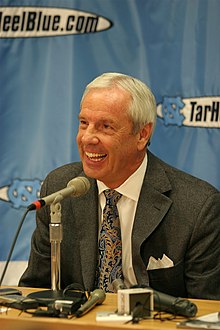 Williams in 2008 | |||||||||||||||||||||||||||
| Biographical details | |||||||||||||||||||||||||||
|---|---|---|---|---|---|---|---|---|---|---|---|---|---|---|---|---|---|---|---|---|---|---|---|---|---|---|---|
| Born | August 1, 1950 Marion, North Carolina, U.S. | ||||||||||||||||||||||||||
| Alma mater | North Carolina ('72) | ||||||||||||||||||||||||||
| Playing career | |||||||||||||||||||||||||||
| 1968–1969 | North Carolina (J.V.) | ||||||||||||||||||||||||||
| Coaching career (HC unless noted) | |||||||||||||||||||||||||||
| 1973–1978 | Charles D. Owen HS | ||||||||||||||||||||||||||
| 1978–1988 | North Carolina (assistant) | ||||||||||||||||||||||||||
| 1988–2003 | Kansas | ||||||||||||||||||||||||||
| 2003–2021 | North Carolina | ||||||||||||||||||||||||||
| Head coaching record | |||||||||||||||||||||||||||
| Overall | 903–264 (.774) | ||||||||||||||||||||||||||
| Tournaments | 79–27 (NCAA Division I) 4–1 (NIT) | ||||||||||||||||||||||||||
| Accomplishments and honors | |||||||||||||||||||||||||||
| Championships | |||||||||||||||||||||||||||
| |||||||||||||||||||||||||||
| Awards | |||||||||||||||||||||||||||
| |||||||||||||||||||||||||||
| Basketball Hall of Fame Inducted in 2007 (profile) | |||||||||||||||||||||||||||
| College Basketball Hall of Fame Inducted in 2006 | |||||||||||||||||||||||||||
Medal record
| |||||||||||||||||||||||||||
Roy Allen Williams[1] (born August 1, 1950) is an American retired college basketball coach who served as the men's head coach for the North Carolina Tar Heels for 18 seasons and the Kansas Jayhawks for 15 seasons. He was inducted into the College Basketball Hall of Fame in 2006 and the Basketball Hall of Fame in 2007.
Williams started his college coaching career at North Carolina as an assistant coach for Dean Smith in 1978. Four years later, North Carolina won the national championship. After ten years as Smith's assistant, Williams became head coach at defending national champion Kansas, in 1988, taking them to 14 consecutive NCAA tournaments, four Final Four appearances, two national championship game appearances, collecting an .805 winning percentage, and winning nine conference titles.
In 2003, Williams left Kansas to return to his alma mater North Carolina, replacing Matt Doherty as head coach of the Tar Heels. In an 18-year period at North Carolina, Williams won three national championships, reached a total of five Final Fours, finished first in the Atlantic Coast Conference regular-season standings nine times, won three ACC tournament championships, one AP National Coach of the Year award, and two ACC Coach of the Year awards. He is third all-time for most wins at Kansas behind Phog Allen and Bill Self, and second all-time for most wins at North Carolina behind his legendary mentor Dean Smith. On January 25, 2020, with a 94–71 win over Miami, Williams reached 880 wins surpassing Smith's 879 win total.
With a total of 903 wins, Williams took his teams to nine Final Fours in his careers at Kansas and North Carolina. Williams is the fifth NCAA Men's Division I head coach to reach 900 wins, and reached the mark in fewer games than any other head coach with 900+ wins. He is the only coach in NCAA history to have led two different programs to at least four Final Fours each[2] and the only basketball coach in NCAA history to have 400 or more victories at two NCAA Division I schools. He is also 14th all-time in the NCAA in win percentage among men's college basketball coaches.[3]
With Williams as an assistant coach under Smith, North Carolina won the 1982 national championship. As a head coach, Williams coached in a total of six NCAA championship games (1991, 2003, 2005, 2009, 2016, and 2017) including both Kansas and North Carolina. On April 4, 2005, Williams won the first national championship of his career as the Tar Heels defeated the University of Illinois in the 2005 NCAA championship game. He again led the Tar Heels to a national title on April 6, 2009, against Michigan State. Williams won his third and final national championship on April 3, 2017, when he led the Tar Heels to victory against the Gonzaga Bulldogs. Williams is one of six NCAA Men's Division I college basketball coaches to have won at least three national championships.
- ^ Wiederer, Dan (October 7, 2008). "UNC has a familiar feeling of high expectations as basketball season begins in five weeks". The Fayetteville Observer. Archived from the original on October 9, 2008. Retrieved April 3, 2022.
- ^ "Game Notes Vs. Villanova" (PDF). Tarheelblue.com. Archived from the original (PDF) on May 28, 2008. Retrieved March 31, 2009.
- ^ Sports-Reference Staff. "Career Coaching Leaders and Records for Win–loss percentage". Sports-Reference.com. Accessed February 26, 2021.